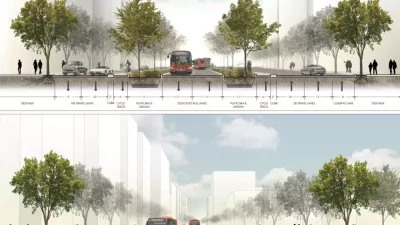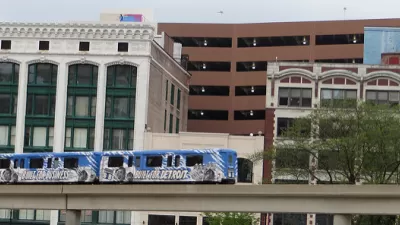The Netflix show Patriot Act, starring Hasan Minhaj, assigns blame for the current state of public transit.
A new episode of Patriot Act with Hasan Minhaj was published today to YouTube that examines with
The episode opens with Minhaj attempting to take public transit to the show in New York City, only to have a bus never show, and a train get delayed for a multiple reasons, until the conductor finally just tells riders "your wife won't remember you."
In the opening monologue, Minhaj says public transportation isn't just destroying his life, "everyone hates public transportation." An article published by CityLab in 2015 gets a shout out to back up that point—the article cites research by USC Professor Lisa Schweitzer published in the Journal of the American Planning Association.
Minhaj, however, quickly expresses his support for the potential for public transit to be a tremendous benefit, citing a 2015 study that links better transportation as the most effective tool for improving economic mobility, and his regret that transit is experiencing a death spiral of reduced ridership, reduced service, and increased fares—each leading to more of the other.
Then, Minhaj gets into the causes for driving's dominance and public transit's decline: the list includes zoning laws, but the focus of the show is devoted to "hidden forces" that want Americans in cars instead of transit. "American Public Transit Is Under Attack" proclaims the show at about 6:43 in the video.
The culprits include the Americans for Prosperity, funded by the Koch brothers—the latter group has recently defeated a transit funding initiative in Nashville and helped get an anti-transit initiative onto the ballot in Phoenix. Minhaj also mentions how the U.S. Department of Transportation has been delaying funding for transit projects allocated by Congress. ("It's longer, harder, and more expensive than it needs to be," says Minhaj. "It's basically a destination wedding.")
FULL STORY: Why Your Public Transportation Sucks

Rethinking Redlining
For decades we have blamed 100-year-old maps for the patterns of spatial racial inequity that persist in American cities today. An esteemed researcher says: we’ve got it all wrong.

Planetizen Federal Action Tracker
A weekly monitor of how Trump’s orders and actions are impacting planners and planning in America.

Walmart Announces Nationwide EV Charging Network
The company plans to install electric car chargers at most of its stores by 2030.

Seattle’s Historic Pike Place Market Leans Into Pedestrian Infrastructure
After decades of debate, the market is testing a car ban in one of its busiest areas and adding walking links to the surrounding neighborhood.

The World’s Longest Light Rail Line is in… Los Angeles?
In a city not known for its public transit, the 48.5-mile A Line is the longest of its kind on the planet.

Quantifying Social Infrastructure
New developments have clear rules for ensuring surrounding roads, water, and sewers can handle new users. Why not do the same for community amenities?
Urban Design for Planners 1: Software Tools
This six-course series explores essential urban design concepts using open source software and equips planners with the tools they need to participate fully in the urban design process.
Planning for Universal Design
Learn the tools for implementing Universal Design in planning regulations.
City of Moorpark
City of Tustin
City of Camden Redevelopment Agency
City of Astoria
Transportation Research & Education Center (TREC) at Portland State University
Regional Transportation Commission of Southern Nevada
Toledo-Lucas County Plan Commissions





























